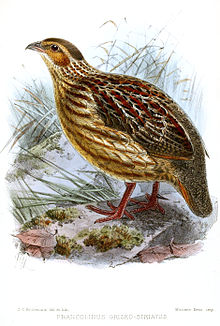Grey-striped spurfowl: Difference between revisions
m →Taxonomy: Fixed CS1 errors: extra text: volume and general fixes |
m Adding a category |
||
| Line 30: | Line 30: | ||
[[Category:Endemic birds of Angola]] |
[[Category:Endemic birds of Angola]] |
||
[[Category:Pternistis]] |
[[Category:Pternistis]] |
||
[[Category:Taxa named by William Robert Ogilvie-Grant]] |
|||
[[Category:Birds described in 1890]] |
[[Category:Birds described in 1890]] |
||
[[Category:Taxonomy articles created by Polbot]] |
[[Category:Taxonomy articles created by Polbot]] |
||
Revision as of 21:28, 4 March 2022
| Grey-striped spurfowl | |
|---|---|

| |
| Scientific classification | |
| Domain: | Eukaryota |
| Kingdom: | Animalia |
| Phylum: | Chordata |
| Class: | Aves |
| Order: | Galliformes |
| Family: | Phasianidae |
| Genus: | Pternistis |
| Species: | P. griseostriatus
|
| Binomial name | |
| Pternistis griseostriatus (Ogilvie-Grant, 1890)
| |

| |
| Geographic distribution shown in green | |
| Synonyms | |
|
Francolinus griseostriatus protonym | |
The grey-striped spurfowl (Pternistis griseostriatus) is a species of bird in the family Phasianidae. It is found only in Angola.
Its natural habitats are subtropical or tropical dry forest, subtropical or tropical moist lowland forest, and subtropical or tropical dry lowland grassland. It is threatened by habitat loss.
Taxonomy
The grey-striped spurfowl was described in 1890 by the Scottish ornithologist William Robert Ogilvie-Grant from a single specimen and given the binomial name Francolinus griseostriatus.[2] Although Ogilvie-Grant specified the habitat as the "Congo River", the type locality has been designated as the Cuanza River area of Angola.[3] The specific epithet griseostriatus combines the Medieval Latin griseus meaning "grey" with the Latin striatus meaning "striated".[4] The species is now placed in the genus Pternistis that was introduced by the German naturalist Johann Georg Wagler in 1832.[5][6] The grey-striped spurfowl is considered as monototypic: no subspecies are recognised.[6]
References
- ^ BirdLife International (2016). "Pternistis griseostriatus". IUCN Red List of Threatened Species. 2016: e.T22678843A92791375. doi:10.2305/IUCN.UK.2016-3.RLTS.T22678843A92791375.en. Retrieved 17 November 2021.
- ^ Ogilvie-Grant, William Robert (1890). "On some new and rare Francolins". Ibis. 6th series. 2: 345–350 [349–350], Plate 10.
- ^ Peters, James Lee, ed. (1934). Check-list of Birds of the World. Vol. 2. Cambridge, Massachusetts: Harvard University Press. p. 82.
- ^ Jobling, James A. (2010). The Helm Dictionary of Scientific Bird Names. London: Christopher Helm. p. 179. ISBN 978-1-4081-2501-4.
- ^ Wagler, Johann Georg (1832). "Neue Sippen und Gattungen der Säugthiere und Vögel". Isis von Oken (in German and Latin). cols 1218–1235 [1229].
- ^ a b Gill, Frank; Donsker, David; Rasmussen, Pamela, eds. (2020). "Pheasants, partridges, francolins". IOC World Bird List Version 10.1. International Ornithologists' Union. Retrieved 11 February 2020.
- Animal Diversity Web, University of Michigan Museum of Zoology 2012. Francolinus Griseostratius classification.

